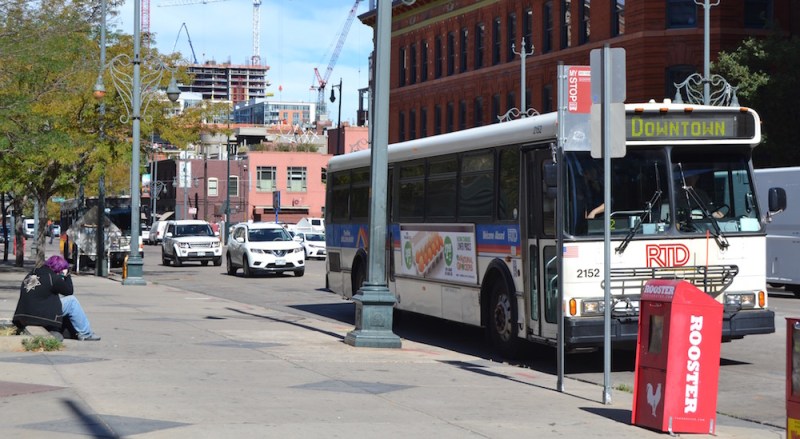RTD Moves to Cut Bus Service as 2019 Fare Hike Looms
The impending cuts will reduce service on several city routes: The 3L, 10, 20, 24, 26, 27, 46, 73, and the Free MallRide on the 16th Street Mall.

The Regional Transportation District will cut service on 18 local and regional bus routes in August — the second round of service cuts this year. Meanwhile, one-way fares for bus and train riders could rise from $2.60 to $3.00 next year.
The impending cuts will reduce service on several city routes: The 3L, 10, 20, 24, 26, 27, 46, 73, and the Free MallRide on the 16th Street Mall. Service in Boulder and some suburbs will also be thinned out.
While the RTD Board approved the cuts two weeks ago, as of today, the agency’s website still doesn’t accurately reflect the final changes. RTD documents [PDF] list the cuts in their entirety, as well as comments received by the public.
The combination of service cuts and fare hikes reflects the tight RTD budget. At a time when Colorado is prepared to spend billions of dollars widening I-70, the biggest transit agency in the state is in austerity mode, making life more difficult for bus riders. RTD can’t even afford to staff all of its scheduled bus service with drivers.
The August service cuts will trim $2 million in annual spending from RTD’s budget. But that savings exacts a huge price on people who depend on the bus to get to work, school, or the grocery store.
Bus cuts can be life-changing, says 9to5 Colorado transit organizer Jenee Donelson. “It’s demeaning to be told that you can’t get to your job on time for the basic means in life,” she said. “It’s demoralizing. On the human level, the impacts can’t be weighed… People have been telling me they have to go back to jail just because they can’t afford to ride the bus or because the route’s been cut or a driver did not show up. This is supposed to be a society that praises re-entry.”
RTD Board members will likely raise one-way fares from $2.60 to between $2.90 and $3 next year. Offsetting the impact of that fare hike, however, will be the debut of discount transit passes for low-income residents and other elements of the fare pass overhaul intended to improve access to RTD’s system.
Still, the combination of service cuts and fare hikes is never a good sign. RTD has fundamental weaknesses that impede its ability to function as a convenient, reliable transit system for Denver. The agency is too vulnerable to the volatile swings of sales tax revenue, and resources are spread too thin, shortchanging the urban core, where transit is most needed, in relation to the sprawling foothill exurbs.
Mayor Michael Hancock claims he wants to deliver a robust transit system for the city, but Denverites are still waiting on City Hall’s blueprint to make that happen. That plan is due out in late July, according to the project manager.


